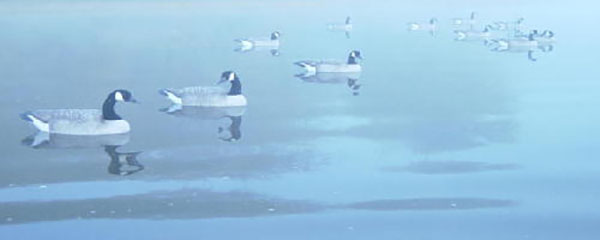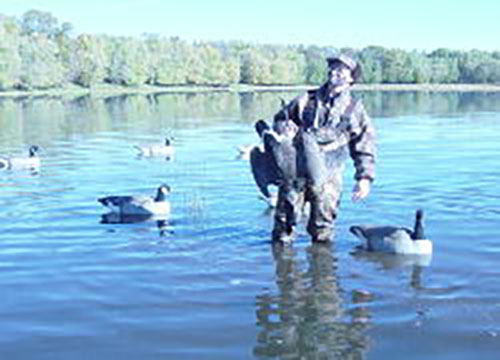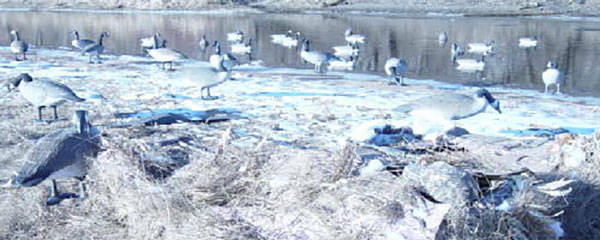Hunting Canada Geese
Hunting Canadas Over Water
by B.C. Maxima
With the recent explosion of the Canada goose population in virtually every state across the U.S., each year new opportunities arise to hunt these magnificent creatures. From the traditional practice of field hunting Canadas in late October, to the more recent inclusion of the early September Canada goose season in many states, hunters are enjoying more liberal bag limits and new opportunities every year. However it also seems to be getting tougher and tougher each year to find a quality place to hunt.

Thus many hunters are now resorting to hunting Canada geese over water and many times on their roost ponds. Although hunting over water can be a very effective method and exciting way to take a limit of birds, it needs to be done properly to be successful and to avoid blowing the entire flock out of the area on opening day.
One of the biggest mistakes that many novice hunters make is to walk into a roost pond, either before dawn or after daybreak and scare the birds off as if they were hunting a duck slough in North Dakota. They then expect the birds to go out to feed and return several hours later. This just doesn’t happen with Canada geese. It does not matter if the birds have been roosting on a particular pond for over a month. As soon as they are scared of their roost pond, more often then not they will not return for over a week; if at all. And they definitely will not return if they are shot off in a half hazard jump shoot mission. That is why field hunting Canada geese has become such a traditional way to hunt. Even if hunters shoot the birds out of a particular field, they most likely won’t vacate the area but instead will head back home to the roost pond. Then they will find another restaurant field the next day, thus offering multiple opportunities to keep hunting the same birds. In turn, they will continue to draw in new birds throughout the fall. Now don’t get me wrong. There are several productive strategies of hunting Canadas over water without sending them out of the area. It just takes a little extra effort and forward thinking.

The rewards of successful morning after a well planned out hunt
The first and most effective way to hunt these birds over water is to find a loafing pond. This is different from the roost pond and takes a little more time and effort to decipher. Many times after the birds vacate from the roost in the morning, they will head out to their favorite diner and will then spend the afternoon basking in the sun on a favorite little loafing pond. This is also one of the main reasons that even hunters who take the time to set up after the birds leave the roost in the morning, will end up with a big goose egg at the end of the day. More often then not, in this situation, the birds will not return to the roost until after dark. This is a great reason for hunters to take advantage of these loafing areas by setting up on a pond that has no geese on it at daybreak but will surely produce around mid morning.
Many times it is also much easier to attain permission to hunt on such an area since as it is often overlooked by other hunters. The key is finding one of these areas. The most effective way is to follow the birds off of their breakfast field in the morning to their favorite loafing pond. The problem comes in when not every flock will use a loafing pond and one must decipher whether they are actually heading back to the roost or not. This scouting method is a little more time consuming and inconvenient since in most instances scouting is done during the week after work and not at 10:00 am, awaiting a flock to complete breakfast. However, if you are able to find one of these ponds, you are sure to be successful. Another added benefit is that these loafing ponds are usually either farm ponds or watering holes which can offer easy drive-up access and nice shoreline cover for a layout blind. This set up also alleviates the need for a boat and all that goes along with a traditional water hunt.
The other water option that works well, especially later in the year, is hunting Canada geese on the river. The nice thing about river hunting is that you can hunt an area of the river without hunting the roost. Thus you are not as likely to scare them out of the area. Also on the river, there are usually multiple flocks using the same area. This offers more birds to hunt as well as the addition of new birds coming into the area as the migration progresses and the smaller lakes freeze up. When hunting the river, one of my favorite set ups is to drag out a couple layout blinds, a dozen full body or silhouette decoys, and a dozen floaters onto an island sand bar. There is usually good cover somewhere near by and these islands are normally public. This is also a much more natural setting than hiding in a boat blind like a regular duck hunting situation.
There are also several methods to hunt this situation. Any of which can be equally effective. The first is to wait until the birds leave the river around 8:00 am or so and then set up to await their return. This can work well although there is always the risk of having the birds shortstop you on a loafing pond and not return until after dark, as explained earlier. Solving this problem is just a matter of taking the time to pattern the birds. Another alternative is to set up before dawn, ideally without spooking any of the birds off of the river in between your spot and the launch.

Then shortstop them as they trade up and down the river before they head out to the fields. Many times the birds will actually move up and down the river from flock to flock before they vacate to the fields for breakfast. One last option that works well, when the situation presents itself, is to get set up during a nasty late season storm. Many times when a storm hits, the birds will feed all day and then return to the roost early due to such circumstances. Your odds of success are increased significantly under these circumstances as the birds are much less wary during whiteout conditions and such.
Hopefully, this article has helped clear up why hunting traditional roost ponds for Canada geese is often not the best answer and has offered several alternatives that may prove to work even better then shooting your birds off of the roost and out of the area. Keep in mind that there are exceptions to every rule but more often than not, hunting the roost is a bad idea and only makes the hunting harder for everyone.
For additional articles please review
- “Magnumitis” by Mike Moen
- “Decoying Canada Geese” by B.C. Maxima
- “The Perfect Rifle” by Mike Moen
- “Planning For Next Season” by Mike Moen
- “Pheasant Hunting 101” by B.C. Maxima
- “Hunting Canadas Over Water” by B.C. Maxima
- “A Guide Tipping Guide” by Mike Moen
- “Tips For Taking Tom Turkey” by Jim Bennett
